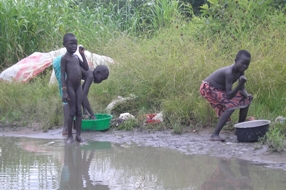Lakes’ Wulu looks to future amid health, agriculture concerns
By Manyang Mayom
September 3, 2008 (RUMBEK) — In Wulu County, Lakes State, an area facing serious challenges across multiple sectors, administrators urged a way forward for their people and cited development aims in a series of exclusive interviews with Sudan Tribune.
 Wulu Executive Nurse William Manyiel Deng said on Sunday that the county suffers from cases of malaria, diarrhea, tuberculosis, and OV (onchocerciasis, or “river blindness”). In February the Government of South Sudan named OV a neglected tropical disease that puts 4.1 million at risk.
Wulu Executive Nurse William Manyiel Deng said on Sunday that the county suffers from cases of malaria, diarrhea, tuberculosis, and OV (onchocerciasis, or “river blindness”). In February the Government of South Sudan named OV a neglected tropical disease that puts 4.1 million at risk.
Deng, who has eight years of experience as senior nurse in the hospital, said that there is little help from NGOs, not even Malteser International, which focuses on combating leprosy and tuberculosis from health centers in Rumbek town, the capital of Lakes State. Malteser Germany operates the Archangelo-Ali-Clinic, also in Rumbek.
“There are severe sicknesses that we usually repair to Rumbek hospital,” said Deng. Wulu is served by a single Primary Health Care Centre, he said. Drugs for the health centre are provided by Lakes State Ministry of Health, with support from Save the Children Sweden.
Water, education, health and roads are common grievances of Wulu communities. “Today schools are operating under the huge trees, especially in Makundrni and Bhar-Gel Payam,” said Ezekiel Thian Mangar, the Wulu Chairperson of Sudan People’s Liberation Movement (SPLM), referring to the large shade trees where classes are held. “Our life is complex and affects education; we are behind and that is what causes our life to become difficult.”
The county’s education director, William Koji Kerjok, echoed Mangar, saying, “Education is the key forward and I am trying to put in place and let education be the priority.” Kerjok, who has been in Wulu two years, said there is a lack of school buildings and that he faces difficulty finding quality teachers. Only 60% of the needed qualified teachers have been found, but the Lakes State Education Minister has promised to end delays of teachers’ salaries, which could help the situation.
Kerjok cited rising levels of girls’ enrollment in Wulu’s 36 primary schools, but noted the challenges of this when girls, in particular among the Beli community, are viewed as a means of obtaining wealth. Relatives of girls in Wulu sometimes impose early marriages, obtaining a bride price and obstructing the opportunity for an education.
According to Kerjok, there are now 265 teachers to cover all four payams and the centre of Wulu—their task ahead is to instruct the approximately 8,000 attending pupils, a figure that has risen due to an attendance initiative.
Even more fundamental problems face Wulu, however, with population increases due to daily influxes of returnees, guinea worm risk, water supply problems, and the potential for a poor harvest this year. There are only eight water hand pumps in Wulu, said Deng.
“We have lost our traditional norms by not having our own home drugs. We are advancing to town life,” he added. But town life and medical treatment remain a distant possibility for many, since there are no roads connecting the county centre to its outlying payams, according to Mangar. By road, Rumbek town itself is 404 km from Juba, the capital of South Sudan. Community cultivation efforts are also reported to have failed, raising the spectre of hunger.
Amid the difficulty, officials stressed a way forward. Mangar emphasized the role of his party, the SPLM, promising that as an elected chairperson, he would make changes in agriculture, get women a training centre to boost the local economy, and support a women’s league that has connections to the payams.
Kerjok urged the Lakes State Authority to allow even workers and adults to go back to school. Deng affirmed that Wulu youth are peaceful, aside from some boxing, and that “we don’t have those behaviors of clan fighting … cultures are now changing into cultures of peace and aiming to build a better New Sudan for all. Wulu must go ahead in peaceful matters.”
The Wulu Department of Sport is preparing to hold an inter-primary competition. This year Wulu boasts 36 football fields and 3 volleyball fields with ten footballs provided to them by Lakes State Ministry of Information and Sport.
Editing by Daniel Van Oudenaren

HONEY
Lakes’ Wulu looks to future amid health, agriculture concerns
nyamaza Fasil. ama ongea kizungu